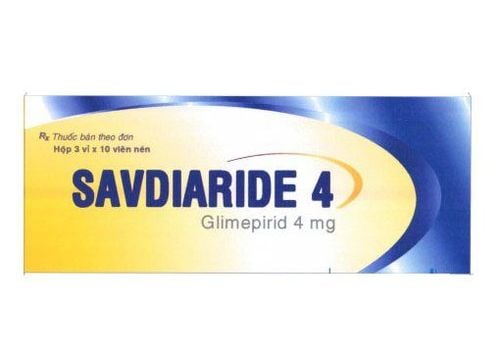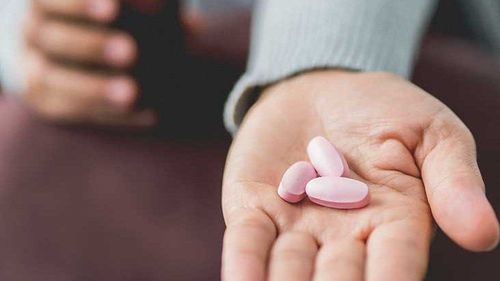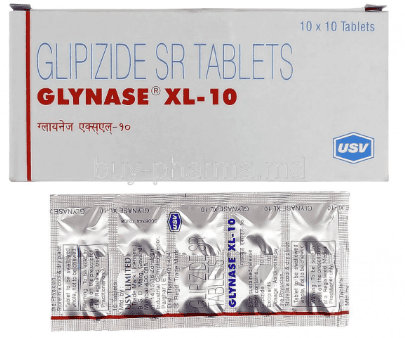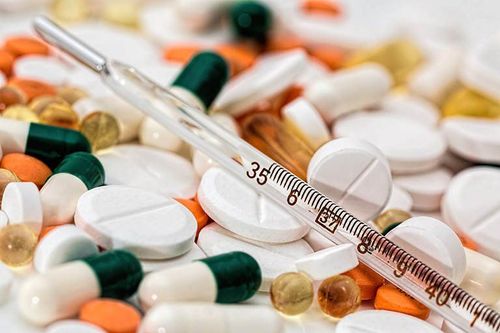This is an automatically translated article.
Nabifar belongs to the group of Hormonal and hormonal drugs, effective in the treatment of type II diabetes that is not dependent on insulin but has been followed by a diet but has not been effective. So what are the effects of Diabifar and what specific cases is it indicated for?
1. What is Diabifar?
Diabifar medicine has the main active ingredient Glibenclamide and other excipients just enough. The drug is prepared in the form of compressed capsules and packed into boxes, boxes of 5 blisters x 12 tablets or boxes with 150 tablets.
2. Uses of Diabifar
2.1 Uses - indications Diabifar is used to treat type II diabetes - non-insulin dependent, when they cannot be treated with diet or reduce body weight through exercise.
2.2. Contraindications Diabifar is contraindicated in the following cases:
People with type 1 diabetes (insulin dependent), juvenile or unstable diabetes. Diabetic coma. People with acute metabolic symptoms in infection or gangrene. People with malnutrition, severe liver or kidney damage. People who are allergic or hypersensitive to the active ingredient Glibenclamide People who are pregnant or breastfeeding. Note: Contraindications need to be understood as absolute contraindications, ie not for any reason that those cases are flexible to use Diabifar.
3. Usage and dosage of Diabifar
How to use: Diabifar is prepared in the form of tablets that should be used orally. Users should take the drug 30 minutes before meals with a sufficient amount of water. Avoid crushing or breaking the tablet while taking it so as not to affect the ingredients in the medicine. Do not take the medicine with liquids such as beer, wine, soft drinks, carbonated drinks.
Dosage: The dose of Glibenclamide needs to be individualized to avoid hypoglycemia.
Usual initial dose: 2.5 - 5mg/day. If necessary, the dose can be adjusted after 1 to 2 weeks, increasing by 2.5 mg in each increment until the required blood glucose level is reached. Maintenance dose: 1.25-10mg/day. Doses greater than 10mg/day should be divided into 2 doses. Not more than 15mg/day. In case you are taking other antidiabetic drugs, switch to using Diabifar: 2.5-5mg for the usual dose after stopping the previous drug. When necessary, increase the dose to 2.5 mg in each increment until satisfactory blood glucose levels are achieved. In the case of malnourished elderly people: It is necessary to reduce the dose because the effects of Diabifar are relatively long-lasting. It is not recommended to use the drug in the elderly. For people with liver and kidney damage: Use 1.25mg/day for the initial dose. Note: users should only refer to the dosage of Diabifar above. Because the dose depends on the body condition and disease severity of each individual. Therefore, patients need to be examined, diagnosed and prescribed by a treating doctor. After that, users need to adhere to the correct dosage, do not arbitrarily increase or decrease the amount of medicine, to avoid affecting the body.
In case of missed dose, the patient can use it as soon as he remembers. However, if it is too close to your next dose, skip the missed dose and use the prescribed dose. Never use a double dose to make up for a missed dose.
In case of overdose, the patient may appear hypoglycemic reactions, toxic manifestations such as headache, sweating, restlessness, insomnia, tremors, behavioral disturbances, poor alertness. apple.
Treatment: the patient needs to be quickly overcome the sudden hypoglycemia by eating about 20-30g of sugar. If necessary, you can eat more sugar after 15 minutes. Then, immediately inform the doctor about the dose used and your current expression for advice and remedy the body's condition. With a bad condition, the patient is comatose, can use the method of pumping sucrose or glucose solution into the stomach or intravenous glucose infusion.
4. Side effects of the drug Diabifar
During the use of Diabifar, in addition to the main effects that the drug brings, patients may also experience some unwanted symptoms such as:
Common symptoms:
Digestive system effects: vomiting, nausea. Uncommon symptoms:
Endocrine effects: hypoglycemia. Skin effects: urticaria, skin rash. Rare cases:
Effects on blood: thrombocytopenia, systemic thrombocytopenia, agranulocytosis. Effects on the circulatory system: causes allergic vasculitis. Effects on skin: appearance of photosensitivity. Hepatic effects: causes jaundice due to cholestasis or hepatitis. Eye Effects: Temporary visual impairment due to changes in blood glucose levels soon after starting treatment with Diabifar. Treatment:
With symptoms of severe infection or affecting the cardiovascular system: after corticosteroid therapy, it is necessary to switch to insulin temporarily.
5. Diabifar drug interactions
When using the drug, users should note some interactions of Diabifar with other drugs as follows:
Combined with the active ingredients Sulfonamide, Salicylate, Phenylbutazone, Fluoroquinolone, non-steroidal anti-inflammatory drugs, Coumarin derivatives, beta-blockers, monoamine oxidase inhibitors. Perhexiline, Clofibrate, Probenecid, Pentoxifylline, Azapropazone, alcohol: may increase the hypoglycemic effect of Glibenclamide. Combination with estrogen-containing contraceptives, Gestagen, sympathomimetics, thiazide diuretics, furosemide, ethacrynic acid, corticosteroids: reduce the hypoglycemic effect of Glibenclamide The effectiveness of the drug may also be affected. effects when combined with anti-tuberculosis drugs. The effect of the drug will increase when combined with Salbutamol or Terbutalin intravenously. Note: in order to minimize the negative interactions that occur, the patient needs to inform the doctor about all the drugs and functional foods that he or she is using to get the right course of treatment. best.
6. Some notes when using Diabifar
The course of diabetes treatment needs to be checked regularly. Hypoglycemia can occur with overdose, excessive dieting, or excessive alcohol and exercise. Care should be taken before using the drug for: the elderly, pregnant and lactating women, young children under 15 years of age, people with liver failure, kidney failure, people with asthenia, hepatic coma , people with stomach ulcers. The article has provided information on what Diabifar is, dosage and precautions for use. Because Diabifar is a prescription drug, patients should not use it on their own, but need to directly contact a doctor or a qualified person to have a suitable prescription to ensure safety for health.













